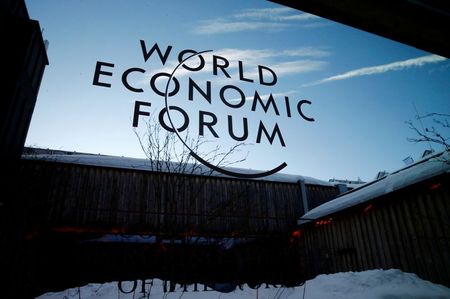
WEF Davos summit: With history at turning point, world leaders pledge to fight for freedom and values

Davos, May 26 (PTI) Global leaders came together at the World Economic Forum Annual Meeting 2022 to pledge to fight for freedom and values against a backdrop of deepening global frictions and fractures and a once-in-a-century pandemic.
The five-day congregation of the rich and powerful from across the world ended on Thursday with many hoping for a better world where no one has to choose between free trade and freedom, or between protecting values or profits. The summit saw Ukrainian President Volodymyr Zelenskyy saying “the words ‘turning point’ have become more than just a rhetorical figure of speech”, and urging that “values must matter”.
The war in Ukraine appeared to have deepened the resolve for commitment to action, while failure of global food, energy and health systems saw calls being made for new partnerships and collaborations. US Climate Envoy John Kerry unveiled a powerful USD 8.5 trillion market signal to commercialise zero-carbon technology as more than 50 companies joined the First Mover’s Coalition which aims to decarbonise heavy industry and transport. India also joined the coalition as a steering board member.
China’s Special Envoy for Climate Change, Xie Zhenhua, announced his country’s commitment to plant and conserve 70 billion trees by 2030, while significant commitments were made by Indian companies towards clean energy and water conservation. The war in Ukraine has created immense human suffering and the wider impacts of the conflict are being felt around the world.
The World Economic Forum (WEF) called for a ‘Marshall Plan’ for the reconstruction of Ukraine. “In Davos, our solidarity is foremost with the people suffering from the atrocities of this war,” said Klaus Schwab, the Forum’s Founder and Executive Chairman. The ‘Special Dialogue on Ukraine’ session brought together 70 global CEOs alongside the Prime Minister of Ukraine (who joined virtually), with the President of the European Commission, the Foreign Minister of Ukraine and the First Deputy Prime Minister of Ukraine at Davos in person, alongside other dignitaries.
CEOs offered concrete ways of how their companies can support the Ukraine government and its private sector in the reconstruction of the country now, rather than waiting for the war to end. The WEF offered its support in this endeavour, advancing discussions on new partnerships and market-driven solutions to enable a scaled up response to the humanitarian situation in Ukraine and other global crises.
Meeting in person after a two-year hiatus, the summit had over 450 sessions, which brought together 2,500 leaders and experts from around the world, including 300 government leaders and 50 heads of state. The WEF said it was a critical opportunity to foster stronger global and regional cooperation to restore stability and create real impact.
The energy crisis, exacerbated by the war in Ukraine, must not deepen the world’s dependence on climate-warming fossil fuels. During the week, there was a focus on accelerating clean energy and climate solutions. CEOs agreed to push for progress on critical 2030 and 2050 global climate targets, mobilising dialogue between governments and the private sector to deliver a successful outcome at COP27 in Sharm el-Sheikh.
A new Global Commission on the Economics of Water was launched to redefine the way we value and incorporate water into economic decision-making. It is led by Ngozi Okonjo-Iweala, Director-General of the World Trade Organization; Mariana Mazzucato, Founding Director of the UCL Institute for Innovation and Public Purpose; Tharman Shanmugaratnam, Senior Minister of the Government of Singapore; and Johan Rockström, Director of the Potsdam Institute for Climate Impact Research.
On the economy front, the Forum’s Chief Economists Outlook report warned of “dire human consequences” from the fragmentation of the global economy. It said developing economies face trade-offs between the risks of debt crisis and securing food and fuel. The rising cost of living hits the world’s poorest communities hardest as the Ukraine conflict has exacerbated already fragile energy and food systems.
A leading group of CEOs, ministers and academic experts agreed on the roadmap for the Market Creators Alliance to develop fairer principles for governments, businesses and public-private partnerships on innovation and industrial development. This will be launched later this year. The Jobs Consortium, a group of public and private sector leaders focused on investment in the jobs of tomorrow, held their inaugural meeting in Davos to drive a global recovery and investment agenda for the next two years.
Business and government leaders highlighted the potential of trade facilitation, finance and trade technology to tackle supply chain barriers. Trade ministers gathered in Davos to hear from business and civil society and prepare for next month’s World Trade Organization Ministerial Conference. Leaders called for diversifying trade and investment relationships to bolster development and support common values. Indigenous and labour leaders called for inclusive outcomes from trade. Food security was high on the agenda.
The World Investment for Development Alliance was launched together with OECD Secretary-General Matthias Cormann, the World Bank, UNCTAD and other partners, to increase collaboration in addressing investment policy and practice. An Accord for a Healthier World was launched at Davos by Pfizer this week, providing all its current and future patent-protected medicines and vaccines available in the US or EU on a not-for-profit basis to 45 lower-income countries.
Pfizer called on global health leaders and organisations to join the accord, bringing their expertise and resources to close the health equity gap and help create a healthier world for 1.2 billion people. The Forum also unveiled the concept of a Global Collaboration Village, a major initiative to harness the potential of the metaverse to create a place where international cooperation can be strengthened.
In a closing address, Olaf Scholz, Chancellor of Germany, called for “a sustainable, resilient globalisation which uses natural resources sparingly and, above all, takes the needs of future generations into account”, adding that a new approach to globalisation would be “based on solidarity which benefits all citizens — in all parts of the world.”

















POST COMMENTS (0)